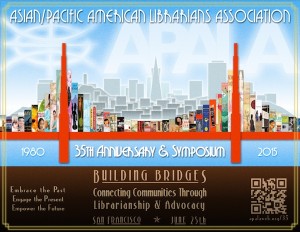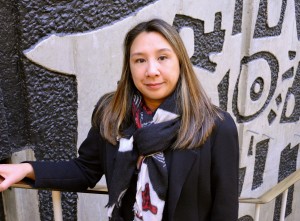Empowering APALA’s Future: Interview with Eileen K. Bosch, APALA President (2014-2015)
by Melissa Cardenas-Dow

In February 2015, APALA Web Content Sub-committee member Melissa Cardenas-Dow corresponded with current APALA President Eileen K. Bosch. We spoke about APALA’s upcoming 35th Anniversary & Symposium, the current state of APALA, and the aspirations of APALA leaders and members for the organization. The following article is the third of a three-part mini-series highlighting APALA’s 35th Anniversary. It also provides an edited version of our conversation.
Early bird registration for APALA 35th Anniversary & Symposium is currently underway until April 3, 2015.
Melissa Cardenas-Dow (MICD): Please briefly tell us about yourself and your position(s) in APALA, especially your role in planning APALA’s 35th Anniversary celebration. How long have you been a part of APALA?
Eileen K. Bosch (EKB): I am the current President of APALA, Chair of the APALA 35th Fundraising Committee and a member of the Steering Committee for the APALA 35th Anniversary & Symposium. I have also served APALA as Vice President (2013-2014), Executive Board Member-at-Large (2010-2012), Chair of the Finance & Fundraising Committee (2011-2014), Public Relations Committee (2011), Literary Award Adult Fiction Committee (2011), Mentoring Committee (2010/11), JCLC/APALA Fundraising (2011-12), and APALA representative for the Spectrum Leadership Institute (2011-2012). I am also responsible for overseeing and coordinating all APALA activities, including dividing direct responsibility among the Executive Director, Vice President, and all Executive Board officers, as well as acting as the spokesperson for APALA within and outside ALA. Since APALA is celebrating its 35th anniversary this year, I have also been overseeing the overall planning and coordination of all of APALA’s programs and events throughout the APALA 35th Anniversary & Symposium and 2015 ALA Annual Conference. As such, I have been working closely with APALA 35th Co-Chairs, Jade Alburo, Gary Colmenar, and Florante Ibanez, as well as Ven Basco, Executive Director, Janet Clarke, Vice-President, and Dora Ho, Treasurer.
MICD: Let’s think about the future of APALA. What do you think APALA aspires to accomplish in the future, both in the short-term and long-term?
EKB: I think that one of APALA’s aspirations is to increase our visibility and recognition within the ALA community, specifically when it comes to issues related to API communities and librarians. To this end, we have been working in cultivating leaders from within APALA who value and practice coalition-building with ALA and the other ethnic caucuses to benefit the API community at large.
MICD: What are some of the efforts we are currently performing, so APALA can achieve these future aspirations?
EKB: We have been prioritizing our work and focusing on addressing some of the goals delineated on the APALA’s Visionary Framework for the Future: APALA’s Strategic Plan. Many of these goals needed to be placed on the fast track to help our association move forward. For example, we have been targeting the completion of an electronic policies and procedures handbook to be distributed to incoming officers and committee chairs at the annual conference. This handbook will not only facilitate the transition process between previous and new leadership, but it would also allow opportunities for aspiring and seasoned leaders to experience a variety of job assignments, projects and development processes. As a small association, we need to focus our efforts on growing and developing leadership to build a network intent on practicing and realizing our core values and vision.

MICD: In the previous article, Ven Basco, APALA’s current Executive Director talked in great length about the need for APALA and its members to be much more visible. What do you think about this? How does more outreach, more communication, more visibility play a role in the future aspirations and empowerment of APALA and its members?
EKB: I think that true leadership involves more than day-to-day operational work. It includes being true and enthusiastic about creating visibility for your group, getting your message across, and sharing your accomplishments. Personally, I think this is the way we can create a leadership support network that builds on itself, make our organization stronger. If the leaders of our association are excited and enthusiastic about creating a better tomorrow for APALA and its members, other members will want to join their leaders to move our association forward. Furthermore, by increasing our visibility, we can recruit new members and attract more sponsors to fund our scholarships and programs. However, in order to do this, we need to have a good communication and outreach plan to be able to put our message out there and let our members know what is going on and how they can help. For example, I don’t know any other APALA members in Ohio. So for me, being able to connect to other APALA members and be able to communicate during committee meetings allows me an opportunity to learn what’s going on and feel connected with other members across the nation.
MICD: What about in terms of specifically promoting and advocating on behalf of API library communities and patrons?
EKB: Currently, APALA collaborates with the American Indian Library Association (AILA) on a joint project, “Talk Story: Sharing Stories, Sharing Culture.” This is a literacy program that reaches out to Asian Pacific American (APA) and American Indian/Alaska Native (AIAN) children and their families. The program celebrates and explores Asian Pacific American (APA) and American Indian/Alaska Native (AIAN) stories through books, oral traditions, and art to provide an interactive, enriching experience. Children and their families can connect to rich cultural activities through Talk Story in their homes, libraries, and communities. Personally, it would be great if we team up with other ethnic associations or organizations to create library programs that could bring APALA closer to API communities.
MICD: What do you see as APALA’s future collaborative endeavors with ALA and other ethnic affiliates and groups? At the moment, we continue to hear a lot about Talk Story. Are there other collaborative efforts that we are cultivating?
EKB: This past year, I have been very happy to see strong camaraderie and partnership emerge between the new leaders of APALA, AILA, BCALA (Black Caucus of the American Library Association), CALA (Chinese American Librarians Association), and REFORMA (The National Association to Promote Library and Information Services to Latinos and the Spanish-Speaking). Some examples of the collaborative work that I can think of at the moment are: our joint efforts in creating an initial Board of Directors for the Joint Council of Librarians of Color (JCLC). This group will work together on the bylaws to be able to incorporate JCLC as a non-profit organization. Another example is participating in CALA’s President Program at ALA Annual 2015. The program “Partnership beyond CALA: Training Leaders of Color for Action” will address how we can work together on training our leaders. This year APALA President’s Program, “Global Roots, Local Identities: Asian International Adoption and Advocacy” will be co-sponsored by ALA’s Video Round Table (VRT). APALA Program Committee Co-Chairs, Janet Clarke (Vice President) and Peter Spyers-Duran, are organizing a great panel featuring the new film “Geographies of Kinship: International Asian Adoption” by award-winning filmmaker Deann Borshay Liem. The panelists are: Dr. Cathy Choy, a historian working on Asian international adoption, and Maria Taesil Hudson Carpenter, a Korean adoptee librarian-activist and APALA member, who has done extensive work at several Korean adoption centers in the Boston and L.A. areas. In addition, we have also teamed up with APA writer and social justice activist, Paul Ocampo, who has received a grant from the San Francisco Arts Commission Individual Arts to develop a collaborative program at the Manilatown Heritage Foundation during the APALA 35th Anniversary & Symposium. The program will include panelists from APALA, poets, and artists to address how they are invested in incorporating history into their work.
MICD: A great deal of effort and planning is being done to ensure that APALA 35th Anniversary & Symposium will be a great success. How do you see it serving APALA’s future goals and aspirations?
EKB: I think that the fact that we are planning and organizing APALA’s 35th Anniversary & Symposium can only help us in our efforts to raise APALA’s visibility and bring more exposure for our association, our members, and our advocacy work in serving API communities. Another good thing to account for is that the challenges associated with the planning, coordinating, and organizing of the symposium in addition to our regular programs and events for 2015 ALA Annual have only helped our association become stronger. As an example, several of our EB officers, Committee Chairs, and APALA members have accepted the call to wear multiple hats either by chairing or serving on several committees to make APALA’s 35th Anniversary a great celebration! As APALA President, I couldn’t be any more humbled and honored with the work of our volunteers, the support of our partners and sponsors, and the achievements of our association! The commitment of our members and partners to go the extra mile for our association just simply warms my heart! This is a pure testament that no matter what, we are growing new leaders and building a network to establish our core values and vision.
MICD: What idea or impression do you hope attendees will get out of the APALA 35th Anniversary & Symposium?
EKB: To get started, attendees will have a great opportunity to see and listen to Valarie Kaur, our keynote speaker. She is an award-winning documentary filmmaker, civil rights lawyer, and interfaith leader who centers her work on storytelling for social change. She has led campaigns on hate crimes, racial profiling, immigration detention, marriage equality, solitary confinement, and the open Internet. Attendees will also have the chance to learn new ideas from a diverse pool of programs, panels, and posters related to libraries, librarians, advocacy, and API communities. In addition, folks will be able to network during the community fair and learn from the many local organizations in San Francisco serving API communities. Since the theme for the symposium reflects the work we have accomplished during our 35 years of existence and continue to do, it is safe to say that attendees will have a great symposium to attend!
MICD: Any closing remarks for our readers?
EKB: As a librarian of mixed race heritage, I have never felt so welcomed, embraced, and enthusiastic like I am in APALA. Our association is not big compared to others, but there’s something about our smallness that promotes a sense of camaraderie, kindness, togetherness, good-fellowship, unselfishness, high-mindedness, industriousness, and forward-thinking in our members and those around us – APALA is awesome!
Questions written and interview conducted by Melissa I. Cardenas-Dow. Editing and writing support provided by Manlia Xiong.
